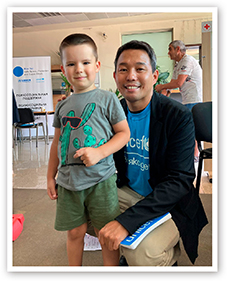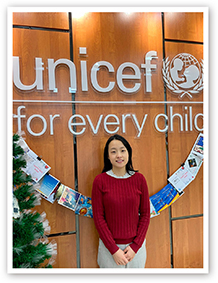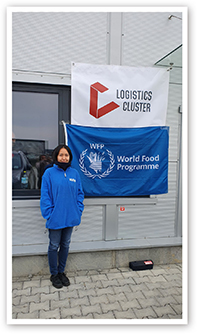Japanese Personnel at International Organizations Note 1 Playing Active Roles on the Front Lines across the World
Mr. NEMOTO Mioh
Deputy, Note 2 United Nations Children’s Fund (UNICEF) Tokyo Office (former JPO Note 3)

In the summer of 2022, I was deployed to the UNICEF Bulgaria Country Office as an Emergency Coordinator for three months to work on humanitarian assistance for displaced persons from Ukraine.
At that time, nearly 700,000 Ukrainians had arrived in Bulgaria via Romania and other countries. Most of them were children and women. In collaboration with the government, NGOs, and communities, I was responsible for all aspects of UNICEF’s emergency response activities on the ground, including planning and implementation of humanitarian assistance programs, such as education and psychosocial care and support to displaced children from Ukraine, emergency supply and procurement, and securing human resources, as well as managing financial resources. Furthermore, while communicating with the Embassy of Ukraine, the Embassy of Japan, and the EU Representative Office in Bulgaria, I tried to be flexible in our humanitarian response given the changing nature of the situation of displaced people from Ukraine.
What served as the core for supporting Ukraine’s neighboring countries were the support hubs called “Blue Dots.” UNICEF established 40 hubs in adjacent countries, working in collaboration with the United Nations High Commissioner for Refugees (UNHCR). The said hubs provided the children and their families with the information and relief supplies they needed for evacuation life, as well as emotional care and spaces for learning and play. “Blue Dots” are administrated utilizing the contributions from the Government of Japan as well as donations from Japanese individuals, organizations, and private companies. The support from Japan is a great help in restoring the daily lives of Ukrainian displaced children, leaving no one behind.
Ms. MAEHARA Masumi
Nutrition Specialist, UNICEF Tajikistan Country Office (former JPO)

I am in charge of the maternal and child nutrition program at the UNICEF Tajikistan Country Office. Despite the country’s economic growth, the nutritional condition of the people is not as desirable as it should be, especially for women and children. In addition to stunting, severe wasting, and micronutrient deficiencies, we have observed an increasing trend in obesity and non-communicable diseases in recent years. In the midst of recovery from the socio-economic damage caused by COVID-19, price rising caused by Russia’s aggression against Ukraine has made it difficult for people to access nutritious food and health services.
Under these circumstances, with the aim of preventing malnutrition, I work to improve maternal and child diets, promote breastfeeding and healthy complementary food for young children, and support the provision of nutrition services at healthcare facilities and in communities. I also support the capacity building of health workers and providing supplies in order to offer treatment and care for children with severe wasting.
With the support of the Government of Japan, UNICEF works to protect the lives and health of pregnant women, lactating mothers, and children, aiming at providing not only nutrition support but also comprehensive support in the fields of vaccines, water, sanitation and hygiene.
Ms. KANEDA Takako
Supply Chain Officer, Supply Chain Operations Division (SCO), United Nations World Food Programme (WFP) Rome Headquarters (former JPO)

In response to the escalation of the aggression against Ukraine in February 2022, WFP began relief operations in Ukraine and its neighboring countries to provide food to those who fled the war, lost their homes and jobs, and became unable to support themselves. WFP had not operated in Ukraine since 2018 and thus had no contracted warehouses or transportation companies. I was deployed to Poland for three months from March 2022 as a member of the first-wave emergency deployment to build a logistics base and a transportation network from Europe to Ukraine from scratch.
Our activities were conducted under certain strain amid the rapidly changing situation upon local logistics regulations, border congestion, and volatile fuel prices. We focused, however, on getting supplies to those in need, in collaboration with private logistics and procurement providers, WFP-led logistics clusters, and humanitarian assistance partners. With the cooperation of the Government of Japan from the beginning of the operation, WFP was able to support 1 million people in conflict-affected Ukraine and the neighboring countries in the one month after the war began, and more than 3 million by the end of the year, through food, cash, and logistical assistance.
- Note 1: Contributed by personnel at international organizations. Titles of individuals are as of the writing of the articles.
- Note 2: Scheduled to be appointed as Deputy Representative of UNICEF Syria Country Office in February 2023.
- Note 3: Junior Professional Officer
